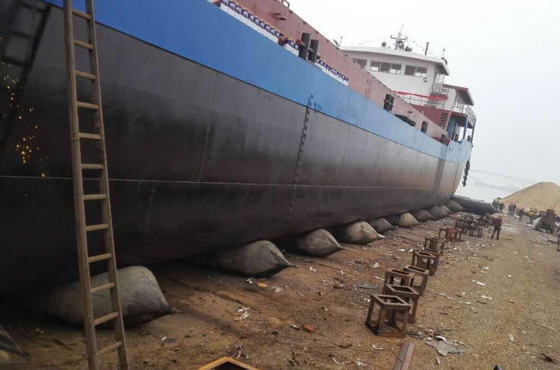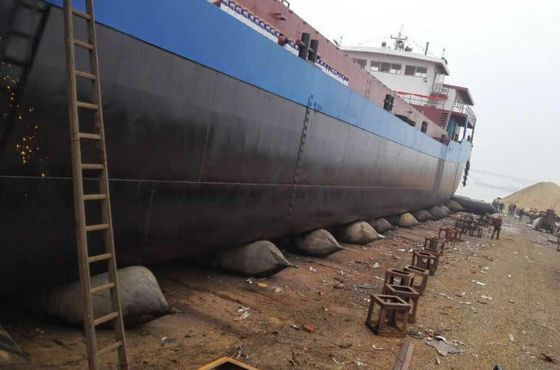HDG Accessories Vulcanized Good Air Tightness Ship Rubber Airbag
Product Introduction:
6000 years ago, our ancestor begin to use log-rolling method to lift and move weights, which is still widely used in daily production and actual life nowadays. Marine rubber airbag is designed with soft rubber to lift and carry weights, based on log-rolling method.
Ship rubber airbag is an innovative product of Chinese own proprietary intellectual property rights. It has wide application like ship launching & upgrading, caisson lifting & moving, heavy weights lifting, underwater-engineering buoyancy aid. The marine rubber airbag is not limited to space and heavy machinery, which could efficiently shorten the construction period and save lots of funds.
Technical Requirements for Ship Rubber Airbags:
According to CB/T 3795-1996, ship rubber airbags should meet the technical requirements
1. Size deviation
The deviation of diameter and effective length is -2%---+2%,
The deviation of the total length is -4%---+4%
2. Elastic deformation
When using 1.2 times the working pressure as the experimental pressure, the diameter deformation is not more than 5%
3. Safety factor
Safety factor is not less than 4.5
Rubber Marine Salvage Airbags Ship Rescue Airbag ISO14409 0
4. Airtightness
Inflate for 1h, the pressure drop is not more than 5%
5. Appearance requirements
Linear smooth, no cracks and bubbles, heavy skin, mixed impurities and obvious dirt and other visual defects.
6. Safety inflation device
The safety valve should be installed on the capsule, and the trip pressure of the safety valve should be 1.25 times of the working pressure.
Specifications:
| Some common sizes of our ship launching airbags, customized sizes are also available |
| Diameter(m) |
Effective Length(m) |
Layer |
Pressure(MPa) |
| 1.0 |
10 |
5~6 |
0.07~0.10 |
| 1.0 |
12 |
5~6 |
0.07~0.10 |
| 1.0 |
15 |
5~6 |
0.07~0.10 |
| 1.2 |
10 |
5~6 |
0.08~0.12 |
| 1.2 |
12 |
5~6 |
0.08~0.12 |
| 1.2 |
15 |
5~6 |
0.08~0.12 |
| 1.5 |
12 |
5~8 |
0.08~0.16 |
| 1.5 |
15 |
5~8 |
0.08~0.16 |
| 1.5 |
18 |
5~8 |
0.08~0.16 |
| 1.5 |
20 |
4~8 |
0.08~0.16 |
| 1.5 |
24 |
5~8 |
0.08~0.16 |
| 1.8 |
12 |
5~8 |
0.08~0.15 |
| 1.8 |
15 |
5~8 |
0.08~0.15 |
| 1.8 |
18 |
5~8 |
0.08~0.15 |
| 1.8 |
20 |
5~8 |
0.08~0.15 |
| 1.8 |
24 |
5~8 |
0.08~0.15 |
| 2.0 |
18 |
6~10 |
0.08~0.18 |
| 2.0 |
20 |
6~10 |
0.08~0.18 |
| 2.0 |
24 |
6~10 |
0.08~0.18 |
| 2.5 |
18 |
7~10 |
0.07~0.13 |
| 2.5 |
20 |
7~10 |
0.07~0.13 |
| 2.5 |
24 |
7~10 |
0.07~0.13 |
Structure of Ship Rubber Airbags :

Instruction of Repair
If the airbag is damaged, it can be repaired as long as the rubber doesn’t age seriously(with no crack and stickiness on the surface). And the cords fabric is not loose and rotten. Repair can be made by hot vulcanization or auto-vulcanization. The tolls and repair materials utilized in the former are quite simple. We recommend hot vulcanization, the steps are as below,
1. Wash the airbags to make sure it is clean both inside and outside and without mud & sand,
oil stain and water logging. Then dry the surface. Note: the immersion time while washing can’t more than 10 minutes.
2. Mark the repair symbol visibly. Mark the repair area and the mark area is allowed to exceed 15mm, don’t miss the concealed damage.
3. Prepare the backing
The material of backing is the same as the airbag and the arrangement angle of the cord fabric is consistent with the airbag.
The first layer of the backing is a vertical line. Length=(length of the flaw+50mm)X2
The second layer of the backing is oblique line whose angle is the same as the airbag. It is 20mm larger than the periphery of the first layer.
The third layer of the backing is also oblique line whose angle is opposite to and crosses with the second layer. It is 20mm large than the periphery of the second layer.
The fourth, fifth and sixth layer may be deduced by analog.
The fillet transition with the radius of 40mm-50mm is required for the backing periphery of every layer.
If the wound is a nail hole within 100mm or strip wound in 50-70mm, cross backing shall be prepared. Nylon cross backing is made by bluing two layers of coated Nylon with the crossing of 90°. Its size is 200mmX200mm and others are the same as the backing.
4. Filing the wound
File the wound with steel files or flexible shaft filing machine. The file pattern on the surface should be delicate and even as well as without any rubber scrap, particle. Filing surface depth is about 0.5-1mm. The periphery is 20mm larger than the backing. Breaking and loose is not allowed for filed cord fabric. After filing, blow always the rubber scrap by brush and compressed air.
5. Brush glue and dry
The whole process must be kept clean. Brush thin glue for the first time (glue: gasoline=1:8).There should be no sediment and caking, should be evenly. Forcibly gluing should be performed so that the glue can penetrate into the cord fabric layer in the file slot. The gluing should be uniform and obvious scaffold erecting is not allowed.
6. Viscose
Firstly, brush a layer of base glue with the thickness of 1±0.2mm on the periphery of the wound. Cool down to not gluing hands, paste and press and the glue should not be too tight in case glue failure happens after the new glue contract, then paste the backing. The center of the backing should be targeted at the wound center. The angle of the backing should be in consistent with the airbag line layer. For wound larger than 1M, a layer of coated Nylon fabric should be pasted to the wound, 25mm lager than the wound. Then paste the backing. In the end, one sealing rubber (thickness of 0.8-1mm,wideth in 20mm) should be pasted to the cover the joint of backing edge and body of airbag.
7. Vulcanization
For normal shipbuilding yard, the following simple method can be adopted: set up a frame, ( as shown in the figure) and provide plate, sand bag(fill the inner tube of the abandoned automobile with sand), jack and heated plate(pig iron or steel plate in Dia300mm ,thickness 25mm). The vulcanized airbag to be repaired should be targeted to the center in accordance with the position shown in the figure. First vulcanize the hole and then the wound. If the large wound to be vulcanized exceeds the effective length of the vulcanization, the center should be vulcanized firstly then both sides. The heated plates should overlap 15mm with the previous position in re-vulcanization. The vulcanization shall be finished within 40-50 minutes when the temperature rises to 135±5℃ and pressure is 0.8-0.12MPa.
8. Check whether the repair is bound tightly or not, Flaw such as void, delaminating or sponge and so on are not allowed. As to new glue in heating area, aging, crack, under vulcanization and over vulcanization is not allowed. Inflating test shall be conducted if the repair is qualified.



FAQ:
Q1: The length you marked is effective or total length ?
Answer: All the size we marked is effective length, not include the cone head parts.
2Q: What's your MOQ?
Answer: Our MOQ is 1pc.
Q3: How about the lifespan of your ship rubber airbags?
Answer: Designed lifespan of our ship rubber airbags is 6 to 10 years
Q4: What's your warranty period?
Answer: Our warranty period is 2 years. we will responsible for the repairment or replace the new ones for you if it proved to be our quality problem.
Q5: What kind certificate you can provide.
Answer: BV, CCS etc.certificate is available
Q6: I have ships but don't know how to choose the ship rubber airbags size and quantity, can you help ?
Answer: Don't worry. We have more than 20 years' experience. Pls tell us your ship information, we can suggest suitable size and quantity for you.
Q7: I want to try your ship launching airbags, but I never use it and don't know how to use, can you help ?
Answer: Yes, we will send instruction book together with the ship launching airbags.

 Your message must be between 20-3,000 characters!
Your message must be between 20-3,000 characters! Please check your E-mail!
Please check your E-mail!  Your message must be between 20-3,000 characters!
Your message must be between 20-3,000 characters! Please check your E-mail!
Please check your E-mail! 


